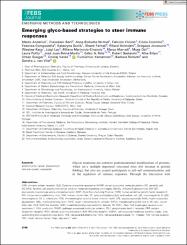Emerging glyco-based strategies to steer immune responses

Göster/
Erişim
info:eu-repo/semantics/openAccessTarih
2021Yazar
Anderluh, MarkoBerti, Francesco
Bzducha-Wrobel, Anna
Chiodo, Fabrizio
Colombo, Cinzia
Compostella, Federica
Durlik, Katarzyna
Ferhati, Xhenti
Holmdahl, Rikard
Jovanovic, Dragana
Kaca, Wieslaw
Lay, Luigi
Marinovic-Cincovic, Milena
Marradi, Marco
Özil, Musa
Polito, Laura
Reina-Martin, Jose Juan
Reis, Celso A.
Sackstein, Robert
Silipo, Alba
Svajger, Urban
Vanek, Ondrej
Yamamoto, Fumiichiro
Richichi, Barbara
van Vliet, Sandra J.
Üst veri
Tüm öğe kaydını gösterKünye
Anderluh, M., Berti, F., Bzducha-Wróbel, A., Chiodo, F., Colombo, C., Compostella, F., Durlik, K., Ferhati, X., Holmdahl, R., Jovanovic, D., Kaca, W., Lay, L., Marinovic-Cincovic, M., Marradi, M., Ozil, M., Polito, L., Reina-Martin, J. J., Reis, C. A., Sackstein, R., Silipo, A., … van Vliet, S. J. (2021). Emerging glyco-based strategies to steer immune responses. The FEBS journal, 288(16), 4746–4772. https://doi.org/10.1111/febs.15830Özet
Glycan structures are common posttranslational modifications of proteins, which serve multiple important structural roles (for instance in protein folding), but also are crucial participants in cell-cell communications and in the regulation of immune responses. Through the interaction with glycan-binding receptors, glycans are able to affect the activation status of antigen-presenting cells, leading either to induction of pro-inflammatory responses or to suppression of immunity and instigation of immune tolerance. This unique feature of glycans has attracted the interest and spurred collaborations of glyco-chemists and glyco-immunologists to develop glycan-based tools as potential therapeutic approaches in the fight against diseases such as cancer and autoimmune conditions. In this review, we highlight emerging advances in this field, and in particular, we discuss on how glycan-modified conjugates or glycoengineered cells can be employed as targeting devices to direct tumor antigens to lectin receptors on antigen-presenting cells, like dendritic cells. In addition, we address how glycan-based nanoparticles can act as delivery platforms to enhance immune responses. Finally, we discuss some of the latest developments in glycan-based therapies, including chimeric antigen receptor (CAR)-T cells to achieve targeting of tumor-associated glycan-specific epitopes, as well as the use of glycan moieties to suppress ongoing immune responses, especially in the context of autoimmunity.

















